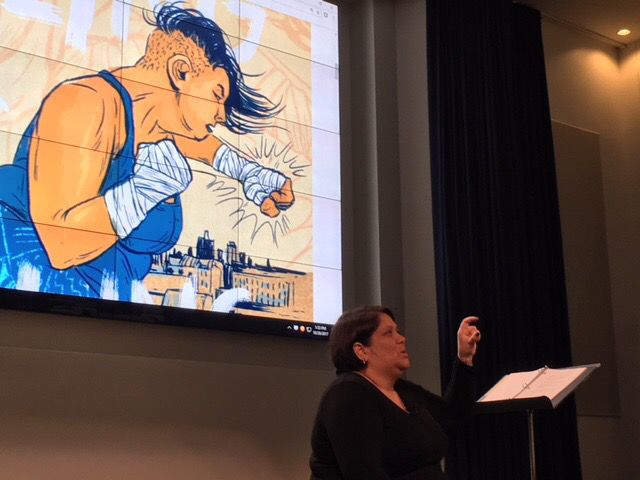Visting Author Virginia Grise procures ‘orgullo’ through various identifiers
If Virginia Grise has anything, it’s “orgullo.”
“I’m not one thing,” Grise told Hilltop Views. “There’s a lot of different things that make up who I am as a person. I want to have a kaleidoscope vision of the world, of thinking about different aspects and factors and if you shift it this way, then all of a sudden, the picture changes. In Spanish, we say ‘orgullo,’ which is pride.”
Grise’s ‘orgullo’ radiates through the way she sprinkles her Spanish effortlessly into her English with a hopeful disregard for separation, the way she wears her string of identities like her crowning jewel through her presence and her writing.
The queer, Chinese-Mexican American playwright visited St. Edward’s University Friday, Oct. 20 as a featured guest of the Communication Speaker Series. The departmental program features “outstanding scholarship in the field of Communication and creative expression,” according to Associate Professor Tere Garza.
Hilltop Views was able to get an exclusive interview with Grise afterwards, in which she spoke about her art and activism, writing practice and advice for up-and-coming artists.
During the event, Grise read excerpts from her book, “Your Healing is Killing Me,” a performance manifesto reflecting on her experience living with Post Traumatic Stress Disorder in a time of trigger warnings. Through much of her visit, she took audience questions, focused on her experience as an artist, her intersectional identity and artistic success.
“Everytime I sit down to write, if it doesn’t change my life in the moment it’s being written, if the result is that it doesn’t change my life, then I’m not successful. Because that’s exactly what I think the word’s supposed to do; it’s supposed to make us better,” Grise said.
Originally influenced by her immigrant father who was concerned with practicality, Grise’s definition of success was largely defined by her ability to make a living. Yet, as she’s come into that aspect, she views success as “creating work that is meaningful to other people and creating work that is truthful to (her) own reality and to the communities that (she) intersects with.”
And her bevy of identities plays into the truth she works to portray in her writing.
“I became an artist because I was trained to listen to and hear my own voice and to find the things that are unique about my voice. The fact that I’m the daughter of a Chinese-Mexican immigrant, the fact that all my circumstances, my lived realities are what contribute to the uniqueness of my voice. The word is written from my perspective, so it is written as a queer, Chinese-Mexican artist, working class artist.”
When confronted with questions of how she overcomes self doubt about whether anyone will care, Grise had this to say.
“I care, and that is always a beginning point, right? When I do sit down to write, I’m writing through something that I need to understand. Already that positions me in a different place because I’m not actually thinking about the audience. I’m thinking about what is the question that I have to work through and the only way for me to do it is to do it.”
Later, Grise told Hilltop Views more about her experience in activism and in art, and the differentiation she makes between the two.
“When I work as a writer, I’m telling my stories; I’m speaking for myself and to my own sense of what is my own truth. When I work as an activist, I have to think about what is the collective will of a people, what benefits the larger community.”
Her last sentiment for Hilltop Views: advice for aspiring writers.
“Write. Write. Write. It sounds dismissive, it sounds simple, but that’s it. Write. Find people to share your work with. Write. Always speak from a place that is your truth. And write. And write the things that scare you. Write the things that make you feel uncomfortable. And write.”







